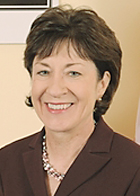
A bill introduced by Sen. Susan Collins (R-ME) Tuesday seeks more than $50 million annually to address workforce training, clinical staffing and support service issues across the U.S., as the nation prepares for the long-awaited “Silver Tsunami.”
The bipartisan legislation, co-sponsored by Bob Casey (D-PA), would reauthorize the Geriatrics Workforce Enhancement Program (GWEP) at $45 million annually over the next five years and reinstate the Geriatric Academic Career Awards program at $6 million per year.
LeadingAge President and CEO Katie Smith Sloan said she was pleased the Health, Education, Labor and Pensions Committee held a hearing on the workforce issue. The Eldercare Workforce Alliance, of which LeadingAge is a member, has endorsed Collins’ bill.
In a letter, the Alliance called programs like GWEP “of vital importance to this country as they equip the primary care workforce and family caregivers with the knowledge and skills to care for older adults and build community networks to address gaps in healthcare for seniors, especially around Alzheimer’s disease and related dementia.”
“This is one of the top concerns of our members in all parts of the country,” Smith Sloan added in a statement emailed to McKnight’s. “In the LTSS sector, the most critical workforce need is for nurses at every level of the profession and for direct care workers. Quality long-term services and supports cannot be provided without a well-qualified workforce. Regulatory requirements increasingly emphasize adequate staffing and training for long-term services and supports. To achieve excellence, providers will need a larger pool of qualified workers.”
Collins noted in a statement that the country is “facing a critical shortage of geriatric health professionals and direct service workers to support our aging population.”
“We currently need 20,000 geriatricians to meet the needs of older Americans, yet there are fewer than 7,300,” she said. “If we remain on our current trajectory, this shortfall will only grow worse.”
The idea is to bolster academics and get more up-and-coming healthcare professionals interested in careers devoted to seniors and the complex health issues they face, including fragility and fall risk; dementia; and medication interactions.
Elizabeth Phelan, M.D., MS, a University of Washington associate professor of medicine and director of the Northwest Geriatrics Workforce Enhancement Center, was one of three experts to testify at the hearing about critical healthcare workforce shortage areas Tuesday.
In prepared testimony, she said many healthcare providers don’t know the “right” things to do for elderly patients “because geriatrics, or the clinical care of the elderly, has not been a part of the training of most health professional in practice today.
“And even those in current training for health professions careers usually still get to the end of their training and never receive any formal exposure to geriatrics,” she said. “With GWEP funding, we have the opportunity to change that.”
She emphasized the importance of training all frontline providers — including nurse practitioners — in senior health issues as family medicine providers are more likely than geriatricians to determine “how well an older adult lives and how long he/she stays living in the community.”
For a full Q&A between Phelan and Collins, click here.



